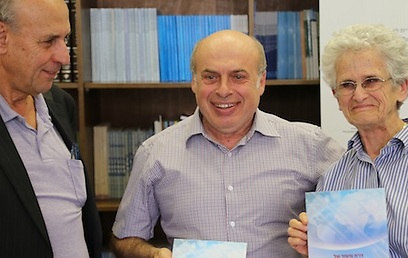
Diaspora Jews want democratic, pluralistic Israel, study finds
Extensive research project by Jewish People Policy Institute shows Diaspora Jews want Israel to respect religious diversity and minorities, view democracy as integral value within Judaism.
Israel must strengthen its democratic values, work toward ending its rule over the Palestinians and loosen the Orthodox grip on religious Jewish life in the country, a study of the expectations of Diaspora Jewry has found.
The study by the Jewish People Policy Institute, a prestigious Israeli think-tank focusing on the development of the Jewish people, questioned Jews around the world on their view of Israel.
The key findings of the study, presented Wednesday by the project's joint leader Shmuel Rosner, said that Diaspora Jewry also wished for Israel to "avoid imposing religious norms on its mostly secular civil society", while at the same time increasing the knowledge of its citizenry about "Jewish history, traditions, and values".
Related stories:
- Reform leader: Orthodoxy in Israel jeopardizes Judaism
- Let’s not lose Diaspora Jewry
- Intermarriage rates among Diaspora Jews at all-time high
Rosner told Ynetnews that he believes Israeli leaders should take heed of the findings.
"If Israel is the 'nation state' of the Jewish people - it should take into account the views of, well, Jewish people," he said.
The study showed that Diaspora Jews believe they have the right to voice their opinions on "issues being decided in Israel", given that policy decisions made in Israel "have an impact on Diaspora Jews' security and wellbeing."

The project also found that Diaspora Jews are increasingly willing to criticize Israel, in particular on matters of Jewish identity. They also advocated closer consultations on certain issues between Israel and the Diaspora, which, they said, would strengthen the bond between the two entities.
With regards to Israel's political systems, the report states that the majority of Diaspora Jewry does not see a dichotomy in Israel being both Jewish and democratic, and in fact, views this as the ideal state, even with the potential for "tensions" that this entails.
The report goes on to state that many Diaspora Jews even see democracy as an intrinsically Jewish value, and any erosion of Israel's democracy would not only have a negative impact on Judaism, but also on the affinity Diaspora Jews feel for Israel.
The study found that because they are a minority in their countries, Diaspora Jews place great importance on the rights of minorities in Israel, as well as on human rights in general. Furthermore, the report said, Diaspora Jews do not view the Jewish state's perilous security situation "as justification for lowering the high values bar Israel is expected to maintain." In the same vein, the report states that in the eyes of the Jews in the rest of the world, "regional reality also does not grant Israel immunity from criticism."
In his background paper, Rosner noted that "on issues relating to the Jewish nature of the state, Israel has to deal with events that demand a temporary judgment – should Women of the Wall be allowed to pray at the (Western Wall) plaza. It must also deal with the long-term and more central repercussions of Jewish marriage. Currently, Israel only offers a religious path to marriage. For Israeli Jews, it is an exclusively Orthodox path controlled by the official rabbinate. Continuing this regime because it makes the state more 'Jewish,' or ending it to make Israel more 'democratic' both have significant implications for the Jewish and democratic future of the state."
The study was based on seminars, questionnaires and conferences involving Jewish communities around the world, which were then presented and discussed during a two-day conference in New York in March.










